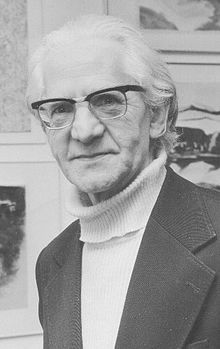Vincenz Frigger
Vincenz Frigger (* 1909 in Elleringhausen , Hochsauerland , † 1986 in Dortmund ) was a German painter and musician.
Musical career
He began studying church music at the Dortmund Conservatory in 1936, but had to leave this school in 1937 due to anti-Nazi attitudes. In the same year he took the first position as organist in Neheim-Hüsten / Sauerland. In 1938 he took up his second position as organist and sexton in Büderich / Werl. In 1961 he was appointed lecturer for organ improvisation at the Dortmund Conservatory . Organist positions followed in St. Gertrudis, Dortmund, and at Paderborn Cathedral .
Picturesque career
While Vincenz Frigger was receiving an academic training in music, he approached painting as an autodidact. He found his personal style in the 50s. His artistic work can be divided into three phases. In the first phase focusing on the lay portraiture and the design of landscapes and village motifs. In his second phase, which began in 1958, he turned to abstraction and sat down u. a. with impressions from nature, including nature destroyed by humans, but also addressed the living conditions of the big city. He was also preoccupied with religious issues. In the mid-1960s he returned to an objectivity modified by the experience of the abstract phase. In his graphic works, socio-critical topics now increasingly come to the fore. Frigger is strongest as a landscape painter.
Basically, his work is characterized by a life-affirming mood. But already in the second, abstract period, colors and shapes also reflect the darker side of life.
Most of his works have gone into private ownership.
Web links
- Vincenz Frigger biography, pictures, audio samples, source material and exhibition list
| personal data | |
|---|---|
| SURNAME | Frigger, Vincenz |
| BRIEF DESCRIPTION | German painter and musician |
| DATE OF BIRTH | 1909 |
| PLACE OF BIRTH | Elleringhausen , Hochsauerland |
| DATE OF DEATH | 1986 |
| Place of death | Dortmund |
